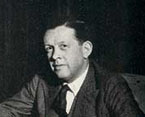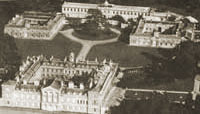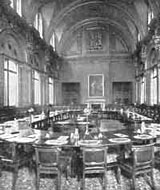
After much discussion in the Cabinet and often bitter argument in the Commons, Churchill initialled a new agreement about the arrangements for propaganda warfare in August 1941. This provided for regular meetings between Eden, the Foreign Secretary, Dalton, the Minister of Economic Warfare and Bracken, the Minister of Information, a position he had acquired in July1941. Under the chairmanship of Robert Bruce Lockhart - a Foreign Office appointment - an operational committee would be set up and at the end of August, 1941, the three ministers so agreed to act as a trinity.
The Executive Committee
Under them they established the agreed Executive Committee of three officials who, in addition to Lockhart, were to be Rex Leeper and as Lockhart's deputy,

Arriving at a name
The day that the formation of the new organisation became approved, Robert Sherwood, a personal friend of Roosevelt and head of the Foreign Information Service, 'in the guise of an information officer', visited Woburn and with a due deference to

The Queen's brother
Late of the Ministry of Economic Warfare, in fact David Bowes Lyon, brother of the Queen, held local connections for he was the 6th, son of the 14th, Earl of Strathmore who had married the daughter of the vicar of Ridgmont, a village very near Woburn. As Leeper's local deputy, in succession to Valentine Williams, it was the influence of David Bowes Lyon that arranged an official visit by the King and Queen to the Woburn organisation, on November 19th, 1941. As a great boost to morale, for some three hours they were shown the propaganda activities.
By the very nature of the work little could be made generally known about the organisation and indeed from autumn, 1941, P.W.E. assumed the title P.I.D. as a cover, employing P.I.D., notepaper and advising the address as P.I.D. of the Foreign Office, 2, Fitzmaurice Place, W1. Having close links with the intelligence service, Leonard Ingrams, as an Under Secretary at the Ministry of Economic Warfare, became that department's principal liaison officer with P.W.E., and David Stephens fulfilled the role as Secretary to the Executive.
The Chairman settles in
As chairman, Lockhart became responsible for the whole of the work of the organisation and for keeping in touch with the Foreign Office, who had the final say on all aspects of foreign policy. In this new appointment he therefore set himself up in the Locarno Room of the Foreign Office but his opinion of Leeper, his former Foreign Office boss at P.I.D., was somewhat unflattering, thinking him already overpaid 'though I would be prepared to pay him more as a pension'! Perhaps the observation carried some worth for even in October, 1941, Leeper had a free house, car, petrol, entertainment
